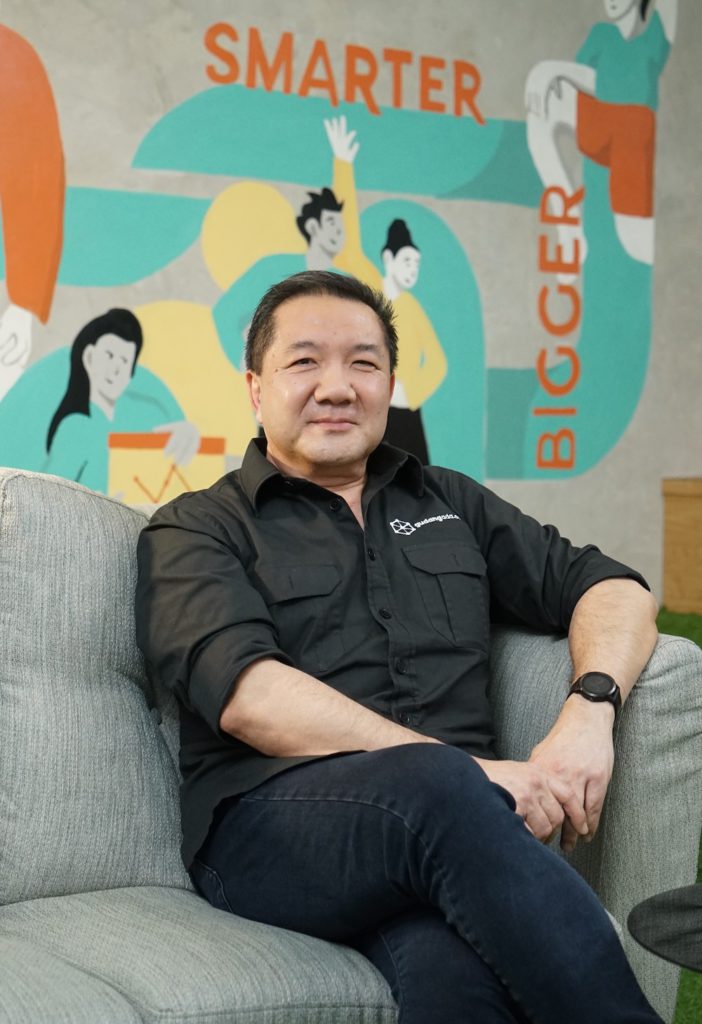Stevensang is a familiar name in Indonesia’s fast-moving consumer goods (FMCG) sector, as he was the CEO of PT Arta Boga Cemerlang for 25 years, from 1992 to 2017. The company is known as the sole distributor for Orang Tua Group, the conglomerate behind famous brands such as Tango wafers and Formula toothpaste.
With a quarter century of experience as CEO under his belt, Stevensang decided to retire. But in 2018, he reemerged in Indonesia’s tech startup scene when he established a business-to-business (B2B) FMCG e-commerce platform called GudangAda.
“Around 80% of FMCG transactions depend on traditional retailers, especially small and medium ones, but the majority of them have not adopted technology optimally,” Stevensang told KrASIA in a recent interview. “Key players in Indonesian FMCG, which include big-name principals and wholesalers, have been running their businesses for decades, but they’re not very familiar with digital solutions.”
Conventional FMCG wholesalers and retailers usually rely on salespeople going door to door to sell their products, Stevensang said. This often translates into prohibitive costs, as it takes at least six months for salespeople to operate in step with the business’ workflow and build sales networks. “Not to mention the sales team usually has a high turnover rate. Supply chain costs for wholesalers and retailers are increasing every year, but their productivity remains stagnant. Therefore, I established GudangAda with a mission to streamline the supply chain within one platform,” he added.

GudangAda has three types of clients—principals which are FMCG companies or manufacturers, wholesalers, and retailers including neighborhood shops or warungs. GudangAda connects these clients on one platform. According to Stevensang, Indonesia’s 3 million traditional retailers need to close their business each time they restock inventory, which can take an entire day. As the platform offers broader product selections and optimizes prices, retailers can speed up inventory turnover and improve order management.
Meanwhile, principals and wholesalers can reach more potential clients through GudangAda’s platform with lower overhead, since they require fewer salespeople.
“In addition, we also provide insights to retailers, like what kind of products are currently in demand, so they can optimize sales better,” Stevensang added.
The startup claims to have 60,000 wholesalers and nearly 250,000 small and medium retailers spread across 500 cities in Indonesia. The CEO said GudangAda logged positive growth this year with its transaction volume in the third quarter surpassed the second quarter’s, which were double that of the first’s. Stevensang admits that his connections with major players built over the years have been useful to land partnerships with wholesalers and principals.
“I believe this is the right time for me to tap into the startup scene, because I understand the pain points and challenges in this industry. I’ve also established and maintained networks with other industry players. Good relationships and mutual trust are crucial in this business,” said Stevensang.
GudangAda closed two funding rounds this year, including USD 10.5 million from Alpha JWC Ventures and Wavemaker Partners in a seed round, plus USD 25.4 million from Alpha JWC, Sequoia Capital India, and Wavemaker Partners in a Series A round.
Nonetheless, it is often difficult to persuade retailers to use digital solutions, according to Stevensang. To address this challenge, the startup has a field team in every city it operates in. These staff members educate users about the benefits of GudangAda’s platform, demonstrating how to use it and what to do if they face technical problems. “Most retailers, especially those who live outside of major cities, are not tech-savvy, so the combination of tech and a human approach is important. We have around 900 team members. Most of them are part of the field team spread across hundreds of cities.”
Going forward, the firm plans to operate in more business verticals. This includes adding a point-of-sales feature, financial services to help small and medium retailers, as well as digital marketing and advertising solutions for principals. “Our vision for the future is that we want to provide a one-stop solution in B2B commerce business,” Stevensang said.
To realize this plan, the firm is set to raise more funding in the first quarter of 2021. “We actually have runway for at least three years, so we’re not only looking for additional funding. More importantly, we want to find strategic partners who can help us build our ecosystem,” Stevensang said, adding the startup aims to raise at least USD 75 million in its next round. GudangAda has a target to have 750,000 users by the end of 2021.
“The COVID-19 pandemic has accelerated digital adoption in many businesses, including those in FMCG retail. I believe the trend will continue even after the pandemic ends, so we’re pretty confident with our plans next year,” he said.
This article is part of KrASIA’s “Startup Stories” series, where the writers of KrASIA speak with founders of tech companies in South and Southeast Asia.

